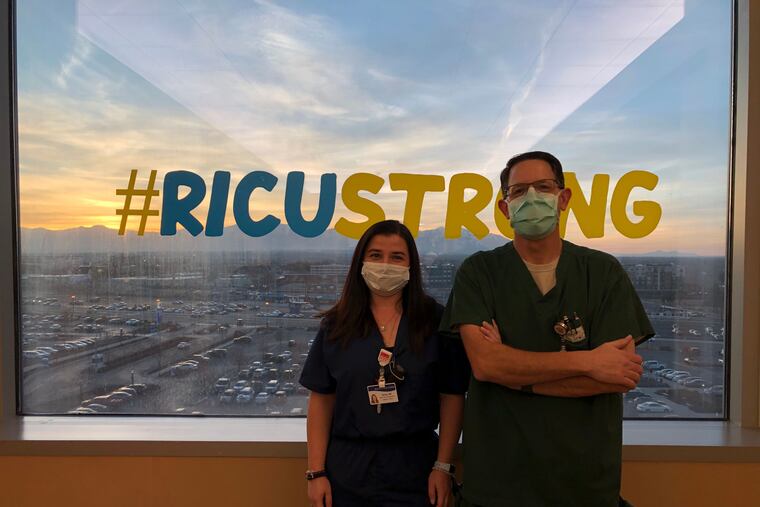Utah hospital workers rushed to New York to help with coronavirus patients in the spring. Their grateful peers just returned the favor.
“I think the surge in New York City changed all of us health-care workers and gave us an incredible feeling of being united, and because of that, being stronger together.”

Darya Haurylava was exhausted and overwhelmed, and so was everyone around her. It was April, and coronavirus cases flooded the New York hospital where she is an intensive care nurse.
“The number of cases kept rising every day — every single patient in my ICU was breathing on a ventilator,” she said. “It felt like the whole world had stopped making sense.”
For weeks, Haurylava and her co-workers were running on fumes and precious little sleep. She wondered how she and other front-line health-care workers at New York-Presbyterian Hospital-Columbia would get through.
Then in mid-April, a group of Utah nurses and doctors arrived at her hospital ready for duty, offering desperately needed relief. Fred Ashton, a respiratory therapist at Intermountain Healthcare, was among the group who volunteered to come to New York for two weeks to help take care of patients. He and Haurylava became fast friends.
“He was simply amazing,” said Haurylava, 36. “I will never forget how Fred and I successfully extubated two of my patients within 30 minutes of each other.”
Before Ashton returned to Utah, Haurylava told him that if his hospital ever needed help, she’d be the first to volunteer.
Several weeks ago, as cases skyrocketed in Utah, she made good on her word.
Haurylava raised her hand to go as soon as she learned that Intermountain Healthcare was in need — coronavirus cases were climbing by double digits, and front-line workers were pulling double shifts. She was among the first of 31 New York-Presbyterian nurses to arrive last month to give overworked nurses in Salt Lake County two weeks of help as they treated patients in crowded hospitals.
“I think the surge in New York City changed all of us health-care workers and gave us an incredible feeling of being united, and because of that, being stronger together,” Haurylava said.
Coronavirus hospitalizations are climbing quickly in Utah, with more than 3,000 new coronavirus cases being reported each day. Back in April, when 100 Intermountain Healthcare workers went to New York City to help at two hospitals, there were about 125 new cases reported each day in Utah.
“Coming to Utah, we felt we had something to offer,” said Haurylava, adding that in New York, there were more than 500 deaths each day in April from COVID-19, the disease caused by the coronavirus. “We’ve been through the worst — we lived through it and came out on the other side. We have seen the nightmare of covid-19, but we made it through, and the nurses [in Utah] will make it, too.”
The coronavirus positivity rate in New York City is now around 3%, with about 48 deaths a week. Cases finally came down after the city went into a shutdown and required everyone to wear masks.
When Haurylava arrived in Utah, she and Ashton enjoyed a small reunion of sorts, then they got to work in one of Intermountain’s respiratory intensive care units.
For Ashton, a father of three teenagers, help this month from Haurylava and her co-workers allowed his team to rest some before gearing up for an anticipated surge of covid cases through Thanksgiving, he said.
“New York was hit with a tsunami — the situation there was much worse than what we’re facing in Utah right now,” he said. “We had a chance to get ready here, and New York didn’t have that. But I know it’s going to get worse here before it gets better, and we were all very happy to get some help.”
» FAQ: Your coronavirus questions, answered.
Other Intermountain Healthcare front-line workers were also thankful for reinforcements.
“Our doctors and nurses have been working for eight months straight,” said Wing Province, an emergency room doctor who works at Intermountain hospitals in Park City and Heber City. Province now holds the hands of dying patients in Utah, just as he did while volunteering in New York in April, he said.
He said a complicating factor for health-care workers is that about 30% of nurses are either out sick with covid or are caring for a family member who has been infected.
“This probably wasn’t a convenient time for the New York team to come here, and it shows how selfless they are,” he said.
Natalie Torrance, a critical care nurse at New York-Presbyterian’s Brooklyn Methodist Hospital, said when she heard that ICUs were operating at nearly full capacity in Utah, she knew she’d soon be on her way to repay the favor.
“I remembered the first night that two of the Utah nurses walked into our critical care unit and how relieving that was,” said Torrance, 28. She and her Utah colleagues are still hopeful that another cycle of “covid-19 payback” won’t be needed in the future.
“We really wish that everyone across the country would wear masks, stay away from large gatherings and help us to keep the cases down,” Ashton said.